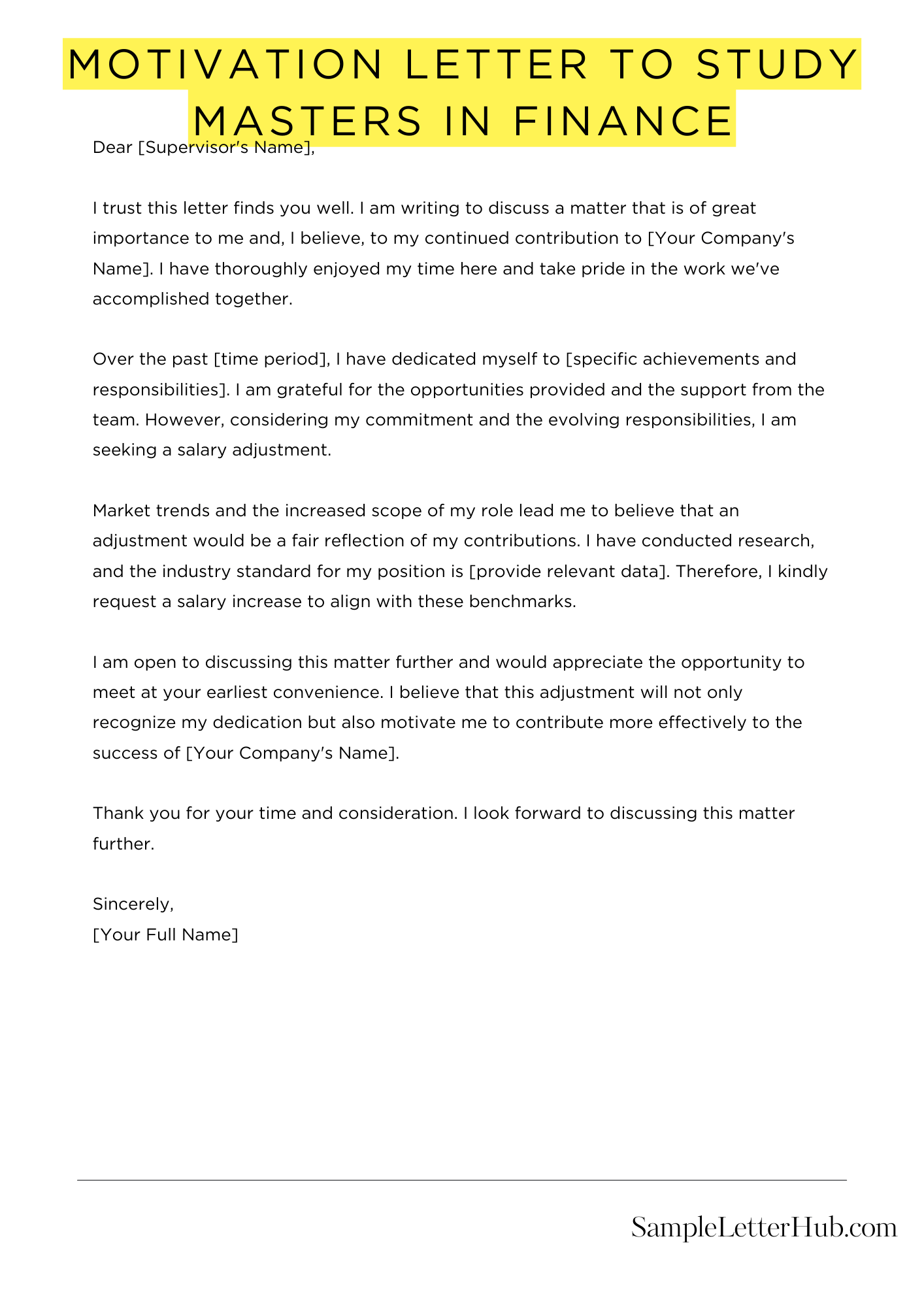A motivation letter to study Masters in Finance is a document that explains your reasons for pursuing a Master’s degree in Finance. It is an important part of your application, as it gives the admissions committee a better understanding of your goals and aspirations.
In this article, we will share some templates, examples, and samples of motivation letters to study Masters in Finance. These samples will help you write a strong and effective motivation letter that will increase your chances of admission.
We have compiled a list of the best motivation letter templates, examples, and samples that you can use as inspiration. These samples have been written by successful applicants to top universities around the world.
Motivation Letter To Study Masters In Finance
Dear [Admissions Officer Name],
I am writing to express my keen interest in the Master’s program in Finance at [University Name]. With my academic background in [Previous Degree] and professional experience in [Relevant Field], I am confident that I have the necessary skills and qualifications to excel in your program.
Throughout my undergraduate studies, I developed a strong foundation in financial concepts, including corporate finance, investment analysis, and financial modeling. I consistently achieved top grades in these subjects, demonstrating my aptitude for finance and my ability to grasp complex concepts.
Furthermore, my professional experience in [Relevant Field] has provided me with practical insights into the financial industry. I have been involved in [List of Responsibilities], which has allowed me to apply my theoretical knowledge to real-world situations. I have also gained valuable experience in [Specific Skills], which are essential for a successful career in finance.
I am particularly interested in the [Specific Area of Interest] specialization offered by your program. The curriculum aligns perfectly with my career aspirations and will provide me with the specialized knowledge and skills I need to succeed in this field.
I am eager to contribute to the vibrant academic community at [University Name]. I am confident that my academic abilities, professional experience, and passion for finance will make me a valuable addition to your program. I am committed to pursuing my studies with dedication and enthusiasm, and I am excited about the opportunity to learn from renowned faculty and interact with like-minded individuals.
Thank you for considering my application. I look forward to the opportunity to discuss my qualifications further and demonstrate how I can contribute to the success of your program.
Sincerely,
[Your Name]

How to Write a Motivation Letter To Study Masters In Finance
A motivation letter is a crucial document that can significantly impact your application for a Master’s program in Finance. It provides you with an opportunity to showcase your passion for the field, highlight your relevant skills and experiences, and demonstrate why you are an ideal candidate for the program. Here’s a comprehensive guide to help you craft an effective motivation letter:
1. Introduction: Captivating Opening
Begin your letter with a strong hook that grabs the reader’s attention. State your name, the program you are applying to, and briefly express your enthusiasm for the field of Finance. For instance, you could write: “As an aspiring finance professional with a deep-seated passion for the intricacies of financial markets, I am eager to pursue a Master’s degree in Finance at your esteemed institution.”
2. Academic Background and Skills: Quantify Your Accomplishments
Highlight your academic achievements, relevant coursework, and any research or project experience that demonstrates your aptitude for Finance. Use specific examples and quantify your accomplishments whenever possible. For example, instead of simply stating that you have a strong foundation in financial modeling, you could write: “During my undergraduate studies, I developed proficiency in financial modeling using Bloomberg and Excel, consistently achieving top grades in courses such as Corporate Finance and Investment Analysis.”
3. Career Goals: Articulate Your Aspirations
Clearly articulate your career goals and explain how a Master’s degree in Finance aligns with your aspirations. Research the industry and identify specific roles or sectors that interest you. For instance, you could write: “My ultimate career objective is to become a financial analyst specializing in equity research. A Master’s degree in Finance from your program will provide me with the advanced knowledge and skills necessary to excel in this competitive field.”
4. Research Interests: Demonstrate Intellectual Curiosity
If you have specific research interests within the field of Finance, mention them and explain how the program’s faculty and resources align with your research goals. This demonstrates your intellectual curiosity and commitment to the field. For example, you could write: “I am particularly interested in the intersection of behavioral finance and algorithmic trading. Your program’s renowned faculty in these areas and access to state-of-the-art research facilities make it an ideal environment for me to pursue my research interests.”
5. Extracurricular Activities and Leadership: Showcase Your Well-Roundedness
Highlight any extracurricular activities, leadership experiences, or volunteer work that demonstrate your well-roundedness and commitment to the community. These experiences can provide valuable insights into your character and soft skills. For instance, you could write: “As the president of the Finance Club at my university, I organized guest lectures by industry professionals and led workshops on financial literacy, fostering a vibrant learning environment for my peers.”
6. Program Fit: Highlight Your Alignment
Explain why you believe you are a suitable candidate for the specific Master’s program you are applying to. Research the program’s curriculum, faculty, and career services, and identify how your skills and aspirations align with the program’s offerings. For example, you could write: “Your program’s emphasis on quantitative analysis, portfolio management, and fintech aligns perfectly with my academic background and career goals. I am confident that I can contribute to the program’s intellectual community and benefit immensely from the mentorship of your distinguished faculty.”
FAQs about Motivation Letter To Study Masters In Finance
1. What is the purpose of a motivation letter?
A motivation letter is a personal statement that explains your reasons for wanting to pursue a Master’s degree in Finance. It is an opportunity to showcase your skills, experience, and goals, and to convince the admissions committee that you are the right candidate for their program.
2. What should I include in my motivation letter?
Your motivation letter should include the following information:
- Your name and contact information
- The name of the program you are applying to
- A brief introduction of yourself
- Your reasons for wanting to pursue a Master’s degree in Finance
- Your skills and experience that are relevant to the program
- Your goals for the future
- A closing statement
3. How long should my motivation letter be?
Your motivation letter should be no more than two pages long. It should be concise and well-written, and it should highlight your most important qualifications.
4. What are some tips for writing a strong motivation letter?
Here are some tips for writing a strong motivation letter:
- Start with a strong hook that will grab the reader’s attention.
- Be specific and provide examples to support your claims.
- Use strong verbs and avoid clichés.
- Proofread your letter carefully before submitting it.
5. What are some common mistakes to avoid in a motivation letter?
Here are some common mistakes to avoid in a motivation letter:
- Making it too long or too short
- Using vague or general language
- Repeating information that is already in your CV
- Making spelling or grammar errors

